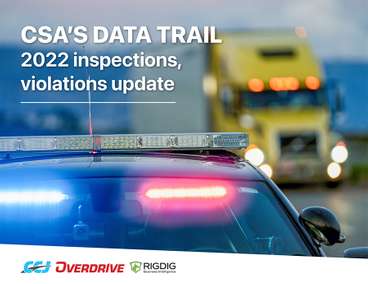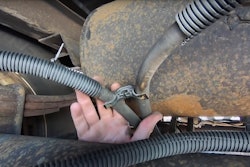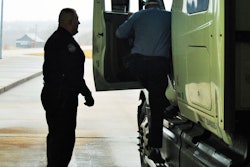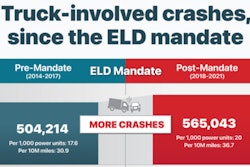The annual Roadcheck inspection event is here -- almost, that is, set for next week, May 16-18 , and taking place across all North American jurisdictions to one extent or another. A lot of the preparation is over and done with, though last-minute and pre- and post-trip inspections no doubt will be ongoing throughout.
Count Mustang's Truckin owner-operator Mike "Mustang" Crawford among the solid fifth of operators who planned to be shut down to avoid the elevated possibility of a pull-in by either taking a little R&R (16%) or putting the rig in the shop for planned work (5%). The latter is longtime flatbedder Crawford's plan this year, as has been the case for him the last few.
"I’ve got my truck scheduled to be in the shop on the 16th," Crawford said, for some work, with other things to take care of around his Long Lane, Missouri, home. "I passed an inspection here recently" with his 1994 Freightliner, he added, so if a load calls him out before Roadcheck is done, "I'm not too worried about it this year."

His flatbed specialty has put him in a variety of securement scenarios over the years -- proper securement is of course one of two principal focus areas for the educational component of the Commercial Vehicles Safety Alliance-led Roadcheck event. A look at individual states' truck enforcement department's activity issuing securement violations points the way forward to identifying possible Roadcheck hotspots. In the map below, find the percentage of securement violations issued in 2022 by states among their broader violation total.
One of the top-ranking states, Wyoming (No. 4), hit Crawford last September with a violation for an inadequate securement device -- "It was my fault, definitely," Crawford said, given he'd failed to see a nick in one of the four-inch straps he'd used to secure the load. Depending on the length of the cut, inspectors apply a downgrade to the working load limit of each strap, and in this case it was a three-quarter-inch cut Crawford just failed to see.
"He pulled out a ruler and actually measured" the cut, Crawford said. "He climbed up on top of the load and looked at the straps on top. Wyoming’s thorough."
The rig all around was in good order otherwise, he said. "They didn't shut me down or anything. ... I took the strap off and put a new one on."
He gave the offending strap to the officer. "A souvenir," he said. "He just laughed and took it."
The inspector, then engaged in a training event with senior officers with Wyoming's enforcement department, Crawford said, had something in common with him. "He had been a firefighter in Cheyenne. He was very thorough, for sure."
Other states known for thorough securement inspection are evident in the darker-shaded areas on the map, including No. 1-ranking Oregon. Oregon's not particularly known for conducting a huge amount of inspections, though -- Overdrive's annual inspection-intensity rankings, a measure of inspections per lane-mile of National Highway System roadway in each state, placed Oregon at 44 among the lower 48. States with inspection-intensity rankings near the top of the list as well as high rates of securement violations (Washington, Tennessee, North Carolina, Maryland) are probably good bets for higher securement-violation risk any time of the year, and more so next week. Download our most recent inspection-intensity and violation-category rankings of states via the 2022 CSA's Data Trail report (keep tuned in the coming months for an updated, 2023 version as well).
Securement violations focus: Top 10 states, along with last year's inspection-intensity rank
- Oregon -- Inspection intensity ranking last year: 44
- Washington -- Inspection intensity: 5
- Tennessee -- Inspection intensity: 13
- Wyoming -- Inspection intensity: 47
- North Carolina -- Inspection intensity: 4
- Alabama -- Inspection intensity: 15
- New Hampshire -- Inspection intensity: 35
- Florida -- Inspection intensity: 20
- Vermont -- Inspection intensity: 40
- Maryland -- Inspection intensity: 2
Crawford emphasized plenty in the way of tried-and-true securement advice applicable to most any open-deck hauling operation. "Take a close look at all your straps,' he said. "Make sure those have no damage, no nicks. Your chains: make sure no links are stretched or with nicks in them. -- all common sense, pretty much."
Securing the load, though among cargo securement rules (full rules at this link) is one that requires the working load limit (WLL) of your securement devices used to add up to at least half the total load weight, there's "no such thing as too many straps," he said. He defaults to twice the required number, generally. Keep an eye on the white tag on all straps, which displays the WLL -- "not to be confused with the WWE," Crawford joked. He's had inspectors ding him for the tag being missing, too, treating it like they treat a strap with a big nick in it, downgrading the WLL.
Check securement early and often, particularly for any load with potential to settle. Mike "Mustang" Crawford has saved more potential violations than he can count with this practice.
Find plenty more advice on inspection avoidance and maintenance via this report from a CCJ-hosted online seminar, in which CVSA's Jeremy Disbrow noted this year's antilock braking systems' Roadcheck focus, too, calling the most-common ABS violation among the simplest to avoid and "one of the easiest things to check." Preventive maintenance can easily save operators the trouble of not seeing the ABS light cycle on when the key turns, indeed the most commonly issued among ABS-related violations.
Warning-light systems on trailers account for well more than half of all air-brake-related ABS violations, as shown in the chart above. Inspectors are getting back on more "normal" footing after the fall-off in inspection and violation numbers in 2020, though not back to pre-COVID levels. Nonetheless, brakes in general are always a huge focus of any inspection that involves the equipment, and owner-operator Crawford makes a routine of periodically going through the air system with a close eye for air lines rubbing on any part of the truck/trailer, with potential to chafe and create a violation.
"While I was home" recently, he "went everywhere I could" all around the unit, he said, and "everywhere I found where an air line was rubbing or could rub, I put protection on it to keep it from chafing."
Long practice in that regard has kept him out of the brakes-related violation buckets in the federal inspection data, making for generally pleasant inspection experiences with minimal hassle.
[Related: Toughest states for brakes violations -- 2022 update]

See how each state stacks up with this comprehensive report
Understand your inspection risk with these national rankings for inspection intensity, highly variable across the United States, as well as where an inspection is most likely to result in a violation in this report from the editors of Overdrive and CCJ in partnership with sister data company RigDig.
Download the report to access state-by-state insights on:
• Moving violations, such as speeding
• Hours of service
• Brakes, lights and other vehicle violations
• Clean inspections
• Violations per inspection
When it comes to the puzzle that can be securement, though, things haven't always been so sanguine over his many years flatbedding. He caught a fairly new officer once out in Colorado early in his career.
"I had a load of drywall, and I had it tarped and was going to Nebraska with it," he said. He climbed Vail and Eisenhower and "got out to 76 to the chicken house out there. There was a guy out there checking the loads. He said, 'Are your straps tight?'" At the tarp job's edges "there was only a couple of inches of strap showing that you could feel." The inspector then instructed Crawford to "un-tarp that whole load to check those straps -- and he didn’t find one thing wrong."
As he readied the full re-tarping, then, "here come a supervisor," he said, who asked the inspector, "Why are these tarps off?"
"I wanted to make sure the straps are tight," the inspector said.
The supervisor, in seeming disbelief, then, as Crawford told it, said, "You couldn't tell? You're going to need a different job."
It was the first such time that had ever happened to him with a tarped load, and to his recollection was the last, too.
Silver lining: Crawford got some help from the supervisor and inspector, both, with the re-tarping before trucking on his way.
Final note: If you're in the habit of rolling your straps with the hook in the center, try the reverse sometime, Crawford said. Throwing straps with the hook unrolling from the center like that in his early years resulted in a broken jaw, once, when the wind caught the strap and blew it right back at him. A freak occurrence, he thought, until "two weeks later the same thing happened," he said. He turned the other cheek bracing for impact and lost a couple teeth.
Keep that hook in your hand, he advised. "You have better control" of the whole thing "with your hand on the hook."
Your teeth will thank you.










